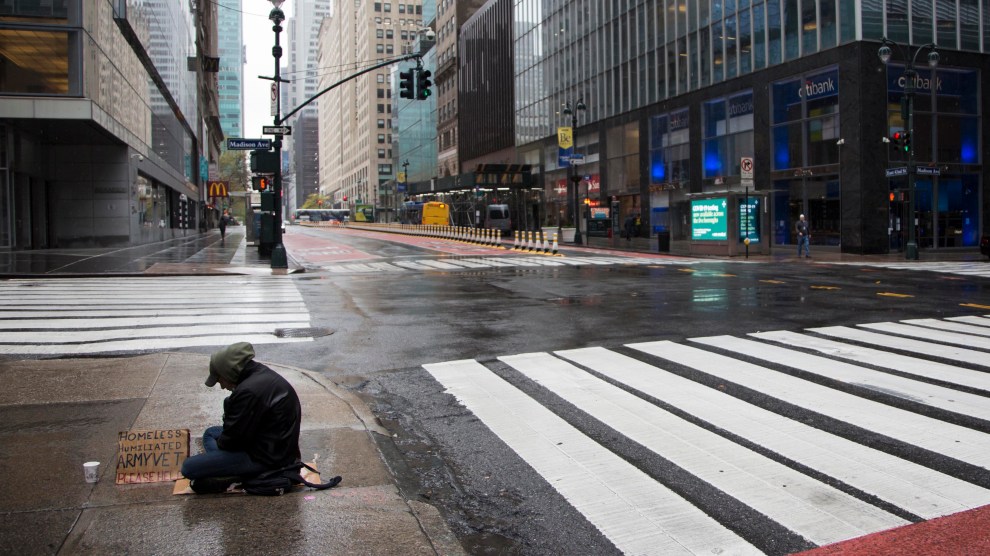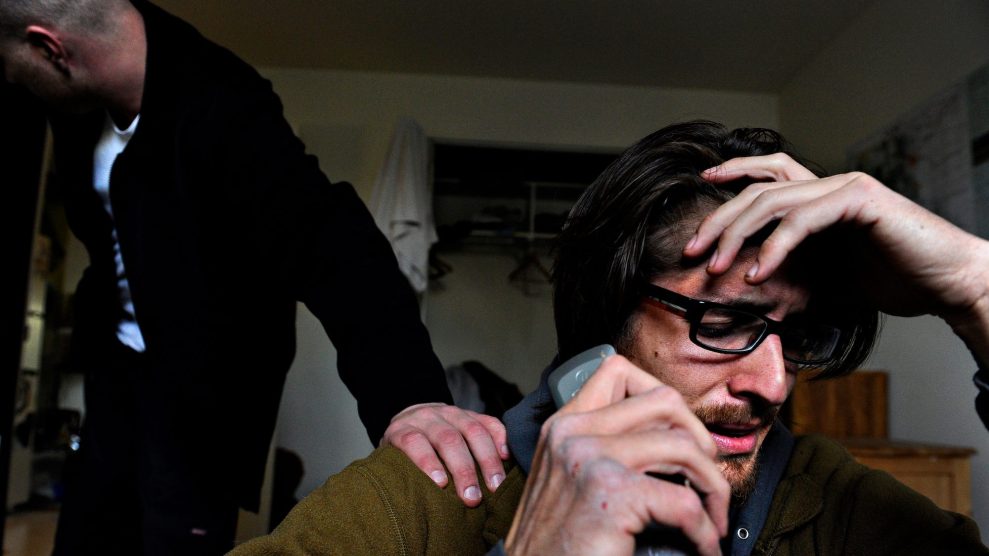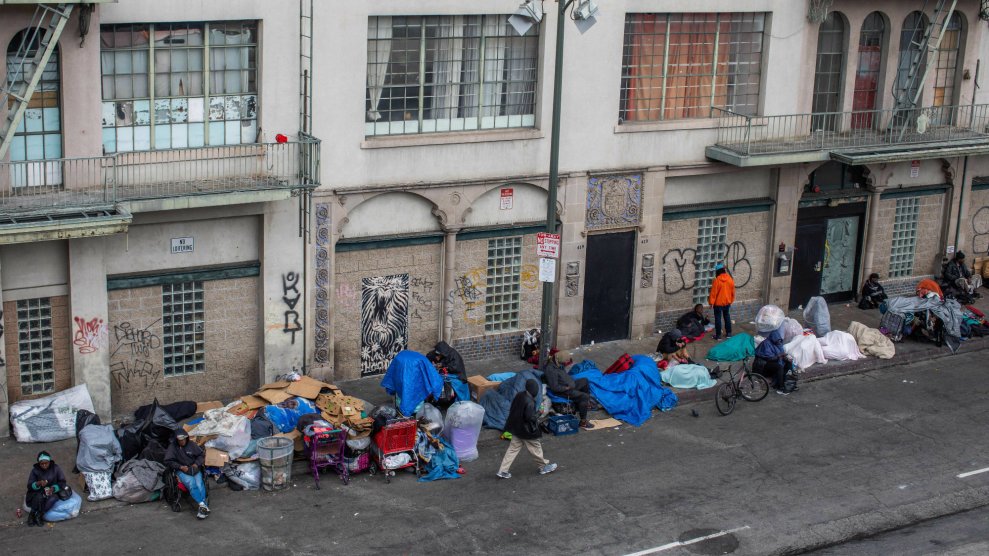
A homeless person sits in the rain in New York City in April. Pablo Monsalve / VIEWpress via Getty Images
As he wandered around the east side of Manhattan, voices rattled around S.D.’s head. It was May 2019, and S.D., a 47-year-old man with schizophrenia, whom I’m naming by his initials for privacy, had just been released from a New York prison. His worldly possessions included little more than the clothes he’d been given by state officials, a white T-shirt and too-big khaki pants, plus a Metro card. He asked a man selling CDs on the street if he could borrow a cellphone to call his godmother for help.
For years, S.D. had been held in a special part of the prison for people with severe mental health problems, and received extra services such as therapy and help monitoring his medications. But when his release date came, his special needs seemed to vanish in the eyes of the law. Prison officials sent him alone to the 30th Street Men’s Shelter on the banks of the East River, leaving him to wander the streets during the day until the shelter reopened around dinnertime.
S.D. wasn’t the only newly released prisoner with schizophrenia meandering through the streets of New York. In 2019, the state corrections department started releasing hundreds of its most mentally ill prisoners to homeless shelters, because there was a long wait list for the special subsidized housing they qualified for, where case workers and mental health staff would be available to assist them. The department’s previous policy had been to keep these prisoners incarcerated past their release dates as they waited for rooms to open up, reasoning it would be unsafe to send them to homeless shelters in the meantime.
But the policy changed after the department was sued for holding people too long. Now, newly free but without access to the psychiatric services they require, some people at homeless shelters have seen their health deteriorate, and some have committed crimes and landed back in prison. Their situation became more dire when the pandemic struck, since people in the crowded shelters were at higher risk of catching the coronavirus.
W.P., a 50-year-old who was diagnosed with schizoaffective disorder and anti-social personality disorder, was also released from a New York prison in May 2019 with his state-issued clothes, a Social Security card, and about $40. Corrections officials sent him to the same shelter as S.D., on the banks of the East River, where he soon felt himself becoming more paranoid. Being surrounded by so many people at night made him nervous, so he tried to isolate himself by avoiding talking with others.
Shelter officials transferred him to another shelter in the Bronx, but he didn’t like it any better. In prison, he’d been able to speak with a therapist once a week, but at the shelter he says it was about once a month. He had to go through a metal detector every time he entered, and all his belongings were searched. His bed was in a crowded dorm, where fights broke out regularly. “I never felt safe being in the open,” he told me recently. He started sleeping just three to four hours a night. “I needed more medical attention, but they didn’t have it there.”
Before W.P. left Sing Sing prison, a doctor recommended that he should live in one of the special housing programs for people with mental health needs, where he could live in the community while receiving extra medical attention and other assistance to stay safe. At these apartments or other housing facilities, he’d have regular access to therapists and case workers who could help with things like applying for benefits and tracking his medication, plus his rent would be subsidized.
Researchers have found that this set-up improves health outcomes for people with mental illness, and reduces their chances of committing crimes: One study of a similar housing program in Ohio found that people who were enrolled were 61 percent less likely than those who weren’t to wind up in prison again over the course of a year. But no rooms were open for W.P. when he needed one. Across the state, wait lists for these housing programs can seem never-ending—with hundreds of people hoping for a spot in many counties at any given time.
Previously, New York’s Department of Corrections and Community Supervision had simply held some people in prison longer while they waited for a room to open, even past their release dates. It’s a symptom of a broader problem: Since the 1950s, states across the country have closed many psychiatric institutions or asylums, which were criticized as being inhumane, but have neglected to fund enough community-based services for people with mental illness. More of them have instead landed in jails and prisons. Like New York, Illinois has also incarcerated people with mental disabilities past their release dates because of inadequate housing on the outside. “The state doesn’t have anywhere close to sufficient housing for people who need mental health services,” says Amanda Antholt, an attorney at Equip for Equity in Illinois, who adds that other states struggle with similar problems.
In 2014, New York’s corrections department issued a guidance that prohibited sending prisoners with such serious mental health needs to homeless shelters, reasoning it wasn’t safe. From 2016 to mid-2019, at least 82 people in their situation were held in prisons past the maximum term of their court-imposed prison sentences because they were waiting for housing, according to court documents; even more were held past the date when they were supposed to get out on parole.
C.J., a 33-year-old with bipolar II disorder, was incarcerated for 502 extra days while he waited for a room, causing him to miss his daughter’s birthday, which he’d planned to celebrate with her for the first time in a decade. The corrections department said he and other men were being held in “residential treatment facilities,” where they theoretically could move about more freely and pursue educational opportunities. But their attorneys said they were still just confined to regular prisons, forced to wear inmate uniforms and follow the rules like all the other prisoners.
In January 2019, the Legal Aid Society and Disability Rights New York, which provides free legal services to people with disabilities, sued over this practice of incarcerating people past their release dates. Several months later, the corrections department issued another memo changing course: From then on, the department would free people with serious mental health needs to homeless shelters, even if they were eligible for the more supportive housing, while they waited for a room. By January 2020, more than 300 people who fit this description were sent to shelters, roughly double the number who went to supportive housing, according to the lawsuit.
In some cases, people’s mental health deteriorated so much in shelters that they were sent to psychiatric hospitals for long stays. One plaintiff in the lawsuit, D.H., was released four times from prison without supportive housing and reincarcerated three times. “The failure to provide those services creates this revolving door where people get out of prison, end up in a homeless shelter, get significantly worse, and end up in an institution,” says Stefen Short, a Legal Aid Society attorney. “Once you have stable housing, you can go to your mental health appointments, the benefits office,” adds Elena Landriscina, an attorney with Disability Rights New York. “Without that first step of having a stable home that’s safe, everything else can’t follow.” Both attorneys now argue in an amended lawsuit that sending these people from prisons to homeless shelters violates the Americans With Disabilities Act. The corrections department declined to comment on the pending lawsuit to Mother Jones. The New York State Office of Mental Health, another defendant in the lawsuit, did not respond to a request for comment.
When S.D., the 47-year-old with schizophrenia, wound up in the shelter system, he had problems accessing his medication. His godmother, who lived nearby, recommended that he bring a small vial of pills with him during the day when he went outside in case he couldn’t get back to the shelter in time at night. But one day when he returned to the facility and they searched him, his pills were deemed unauthorized and confiscated, his godmother says. He missed doses and became sick with an upset stomach, dizziness, and anxiety. He was then hospitalized with auditory hallucinations and suicidal thoughts.
Meanwhile, when the pandemic struck New York City this spring, W.P. was still living in a Bronx shelter. As people in the facility started getting sick, the city agreed to move the other shelter residents to private hotel rooms on the Upper West Side of Manhattan. The security guards followed them to the hotel, and they still searched their bags, but finally W.P. had a room of his own. He felt safer and started sleeping at least eight hours a night, more than double his usual shuteye at the shelter.
But as the virus spread through the city, it became even harder for him to reach his therapists; he says they’ve spoken just three times since he got to the hotel several months ago. And it still doesn’t feel like home: He doesn’t have a closet, so he lives out of a duffel bag, and he’s not allowed to put photos up on the wall. Other residents in the neighborhood have been complaining about homeless people staying there. “They said a lot in the neighborhood went down, so they came up with signatures to try to get us out of here,” W.P. told me. His paranoia has continued to grow. “I’m trying to avoid going back” to Sing Sing, “so I just isolate myself,” he said. Friends and family aren’t allowed to visit the hotel room. Being alone so much of the time reminds him of prison. “They technically are responsible to make sure you are rehabilitated and move back in the community as fast as you can, make you a citizen,” he said of the corrections department. “But by putting you in a shelter, isolating you, they’re making it worse.”
At this point, it’s been more than a year since he was released from prison and deemed eligible for supportive housing, but he’s still on a wait list. Once the pandemic ends, he’ll likely go back to a shelter. He reads Stephen King novels and listens to soul music and Madonna to distract himself.
S.P. has been even less fortunate. After he missed doses of his medication and was hospitalized for months, he told hospital staff he felt depressed partly because he couldn’t live independently. In July, he got into a couple of fights at the hospital and injured another patient. The police arrested him and sent him back to jail.













